![Top 15+ Sports Betting App Development Companies [Updated List]](https://media.apptunix.com/wp-content/uploads/sites/3/2025/12/30083037/banner-20.png)
Top 15+ Sports Betting App Development Companies [Updated List]
1259 Views 14 min December 20, 2025

Hardeep Singh is a seasoned B2B technical writer at Apptunix with a sharp eye for strategy and a mind wired for innovation. With over a decade of experience in technical and SEO writing, and a Master’s degree in Wireless Communication, he’s written across domains including AI, Blockchain, IoT, Cybersecurity, and beyond. At Apptunix, Hardeep drives content that bridges business goals with future-ready mobile and web solutions, thus helping startups and enterprises make smarter digital decisions.
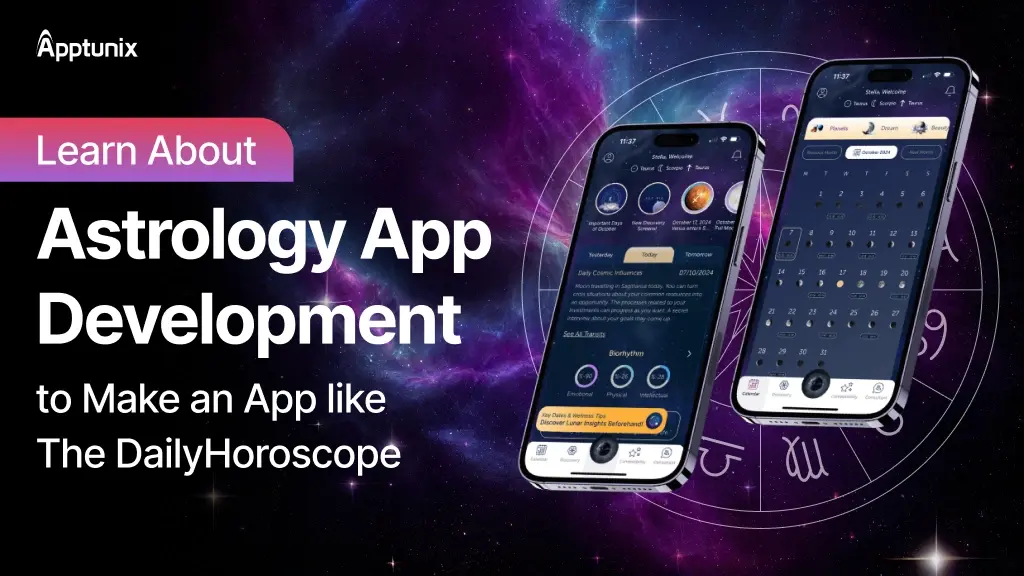
Have you ever wondered why astrology apps are taking over app stores and trending on social media?
It’s not just a cosmic coincidence – it’s a billion-dollar movement. With more people turning to the stars for daily guidance, love insights, and career forecasts, astrology has transformed from a niche hobby into a digital phenomenon.
The global astrology app market is skyrocketing, expected to grow from $3.94 billion in 2024 to a staggering $4.75 billion in 2025, reflecting a 20.5% compound annual growth rate (CAGR). It is further expected to see an exponential growth in the next few years, reaching $9.91 billion in 2029 at a CAGR of 20.2%.
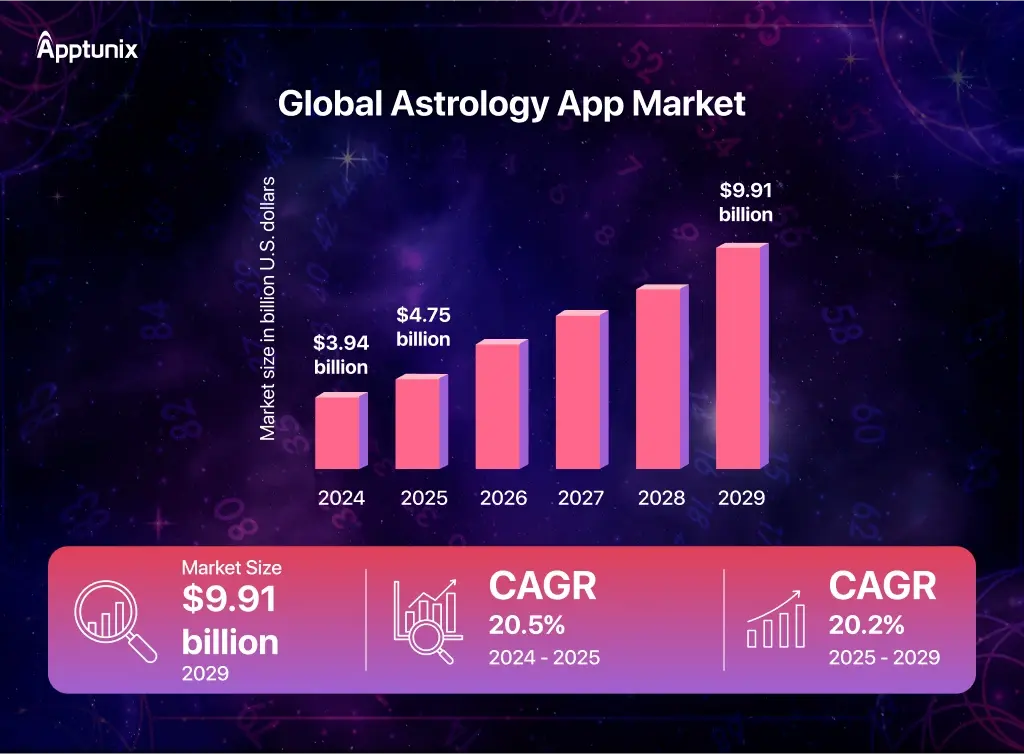
That’s more than a trend – it’s a calling for entrepreneurs and visionaries to create something powerful, personal, and profitable.
Well, let’s be straight. If you are planning to build an app like The Daily Horoscope, you are not alone. Millions trust it every day for astrological updates – and now, you can create something even better.
As a top-rated astrology app development company, we will guide you step-by-step. Whether you are dreaming of a zodiac-based compatibility app or envisioning an AI-powered birth chart generator, this blog is your ultimate roadmap to success.
Let’s unlock the cosmic code of astrology app development – and launch a product the stars would be proud of.
Needless to say, in an age where data meets destiny, astrology apps are quietly becoming one of the most profitable and emotionally engaging segments in the mobile app industry. But what’s fueling this sudden cosmic surge?
It’s not just belief but a combination of generational behavior, digital transformation, and a yearning for self-understanding.
1.Rising Demand & ROIFrom millennials navigating love lives to Gen Z seeking daily direction, astrology has moved from newspaper back pages to the front lines of mobile user engagement. Today’s users aren’t just looking for a horoscope; they expect personalization, instant access, and AI-powered insights.
According to Statista, the number of astrology app users globally has doubled in the last five years, with apps like Co-Star surpassing over 20 million downloads. These users aren’t passive readers but are highly engaged, often opening astrology apps 2 – 3 times a day, especially during mornings or decision-heavy moments.
Moreover, the monetization potential is immense. Subscription-based models, in-app purchases, and live consultations have turned spiritual advice into a scalable revenue engine. Well, with the market expanding at a CAGR of 20.5%, now is the moment to capitalize on this opportunity through strategic horoscope app development.
2.Competitive AdvantageLook at apps like Co-Star, Sanctuary, and Astroyogi. These platforms have successfully blended traditional astrology with next-gen tech using AI to deliver hyper-personalized horoscopes, sleek UI/UX design to hook daily users, and expert-backed insights to build trust.
Co-Star leverages NASA data and a proprietary algorithm to give real-time astrological updates.
Sanctuary offers live chats with astrologers and tarot readers, combining instant gratification with spiritual connection.
Astroyogi, a leading astrology platform in India and the Middle East, integrates astrology with marketplace features for consultations, becoming a full-service platform.
Now the question is, what do these apps share in common?
A deep understanding of user psychology and seamless, cross-platform delivery. Their success proves that this is not just a passing trend but a sustainable business model, especially when paired with intelligent astrology app development.
So if you are launching a daily horoscope app clone, an AI-powered birth chart generator, or a zodiac-based compatibility platform, you are on the right track.
Before diving into development, it’s crucial to understand the types of astrology apps dominating the market. From daily horoscopes to real-time AI readings, each format caters to a different audience and monetization model. Here’s your complete zodiac app development guide – segmented by format, function, and future-readiness.
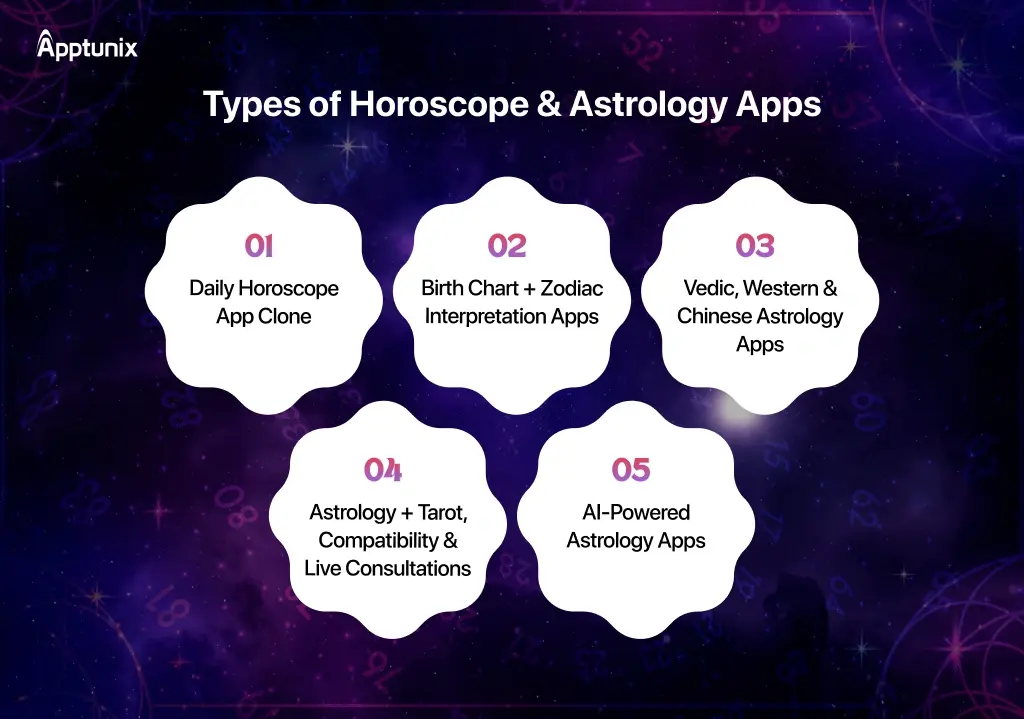
1.Daily Horoscope App CloneDaily horoscope apps are the foundation of digital astrology. Their simplicity, routine usage, and viral shareability make them a go-to model for first-time founders. A successful daily horoscope app clone offers:
Apps like The Daily Horoscope and AstroSage thrive due to their lightweight structure and consistent content updates. If you are looking to enter the market fast and build retention through habit, this is your ideal launchpad.
2.Birth Chart + Zodiac Interpretation AppsUsers today crave hyper-personalized astrology, beyond the generic sun sign. That’s where birth chart and zodiac analysis apps excel. These tools calculate:
This zodiac app development approach suits users willing to engage deeply with astrology and often leads to higher conversion for premium features like personalized reports or 1:1 astrologer consultations.
3.Vedic, Western & Chinese Astrology AppsThe global reach of astrology means localization is a major growth lever. Modern apps now target specific astrological traditions:
Building culturally adapted apps isn’t just smart, but scalable. You can expand by integrating multilingual support, regional horoscopes, or even combining traditions into one app for a global audience.
4.Astrology + Tarot, Compatibility & Live ConsultationsBlending astrology with other spiritual practices creates a richer and more immersive user experience. These hybrid apps allow users to access:
These features not only enhance engagement but also unlock high-revenue monetization models like pay-per-minute expert calls or premium compatibility reports. Apps like Sanctuary and Astroyogi are top examples in this space.
5.AI-Powered Astrology AppsThe newest frontier in astrology is being driven by AI and machine learning. These apps process massive astrological datasets to deliver real-time forecasts and behavior predictions tailored to each user. AI-enabled astrology apps can offer:
The demand for an astrology app with AI and machine learning features is surging, especially among Gen Z users who value immediacy and interactivity. This category also provides exciting possibilities for integrating GPT-based models and sentiment analysis.
A successful astrology app isn’t just about star signs, but about delivering a personalized, visually engaging, and emotionally intuitive experience. Your users aren’t just checking predictions; they are building rituals. That’s why every feature must be crafted to offer instant value and long-term connection.
From daily horoscopes to real-time chat with astrologers, here’s what users expect and what your app needs to deliver:
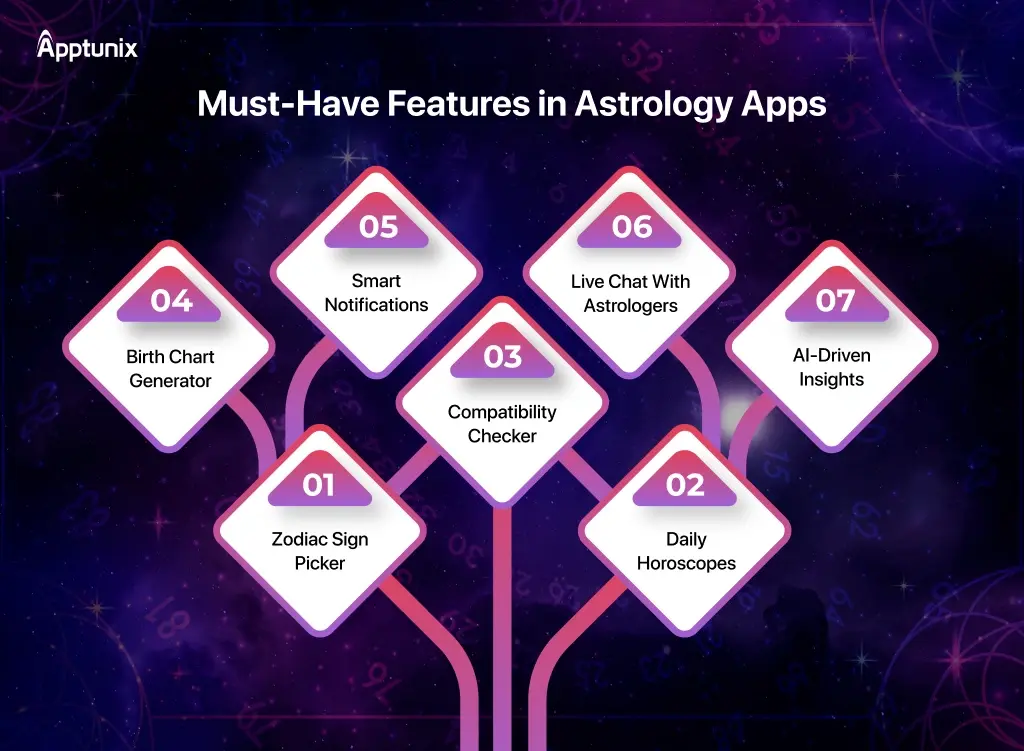
A clean and one-tap selection tool to personalize user journeys from the moment they open the app.
Auto-generated or astrologer-written, tailored content that drives daily engagement. Push notifications help form user habits.
Uses synastry techniques in order to determine romantic or friendship matches. One of the most interactive features, especially among Gen Z.
Creates natal charts based on birth date, time, and location – often integrated with AI for interpretation and deeper insights.
Timely alerts for horoscope updates, full moons, retrogrades, or live events that encourage consistent app usage.
Lets users consult professionals in real-time. Premium access or pay-per-minute boosts monetization.
Machine learning enables personalized suggestions based on user behavior, transits, or even mood logs. This elevates user trust.
Users don’t just want information; they want experiences that feel magical. Your astrology app UI/UX must reflect cosmic beauty while remaining intuitive. Here’s how:
When astrology app UI/UX design is done right, users won’t just read horoscopes but will return daily because the app feels like a part of their emotional journey.
| Feature | User Benefit |
|---|---|
| Zodiac Sign Picker | Quick onboarding and personalization |
| Daily Horoscopes | Daily guidance and habit-building |
| Compatibility Reports | Fun, emotional engagement; high shareability |
| Birth Chart Generation | Deep personalization and trust |
| Smart Notifications | Keeps users consistently engaged |
| Live Astrologer Chat | Builds credibility and offers premium interaction |
| AI-Driven Insights | Enhances accuracy and personalization over time |
| Customizable UI Themes | Emotional resonance and user ownership |
It goes without saying that behind every intuitive and magical astrology app lies a rock-solid tech foundation. Whether you want to build a cross-platform horoscope app or develop an intelligent AI-powered astrologer, the right stack will determine your app’s performance, scalability, and personalization depth.
Let’s walk through the complete tech anatomy.
1.Platform Choice & Cross‑Platform Horoscope App DevelopmentChoosing your mobile development framework is one of the earliest and most crucial decisions. Whether you want fast deployment or platform-native performance, each option has trade-offs:
| Framework | Pros | Cons |
|---|---|---|
| Flutter | Fast development, single codebase, beautiful UIs | Larger app size, fewer native APIs |
| React Native | Strong community, faster iterations, reusable code | Performance may lag for animations or high-compute tasks |
| Swift/Kotlin | Native performance, full OS integration | Separate codebases, longer development time, higher cost |
For MVPs or daily horoscope app clones, Flutter or React Native are ideal for cross-platform development. But for advanced AI-integrated features or real-time consultations, native frameworks offer long-term reliability.
2.Backend & Data ArchitectureYour backend must do more than just store user data. It needs to compute planetary alignments, integrate third-party APIs, manage live astrologer chats, and scale during surge traffic (like full moons!).
Here’s what powers the best astrology apps:
This ensures your astrology app development process is ready for both security and scale from day one.
3.Implementing AI & Machine Learning in Astrology AppsToday’s users expect more than static horoscopes. They want smart, evolving, and emotionally accurate predictions, and that’s where AI comes in.
Leading apps now use:
You need to know that building an astrology app with AI features is not just about automation but about creating trust through intelligent, evolving insights.
Tech Layer vs. Purpose Table
| Tech Layer | Purpose |
|---|---|
| Flutter / React Native | Build cross-platform apps fast and cost-effectively |
| Swift / Kotlin | Ensure top performance for native Android/iOS apps |
| AWS / Google Cloud Platform | Scalable backend infrastructure and low-latency user experience |
| PostgreSQL / Firebase | Secure, real-time storage for user data and chart histories |
| Ephemeris API | Accurate planetary calculations and horoscopic data |
| OpenAI / ChatGPT API | Natural language horoscope chat experiences |
| TensorFlow / PyTorch | Implement machine learning models to refine predictions over time |
Pro tip: The more data your app gathers, the smarter it becomes. AI doesn’t just support astrology, but redefines how users experience it.
Creating a successful astrology app, one that rivals The Daily Horoscope or even outshines it, is about precision, personalization, and purpose. Whether you are targeting Gen-Z stargazers or seasoned spiritual seekers, here’s your complete roadmap to build your own astrology app that’s loved, downloaded, and monetized globally.
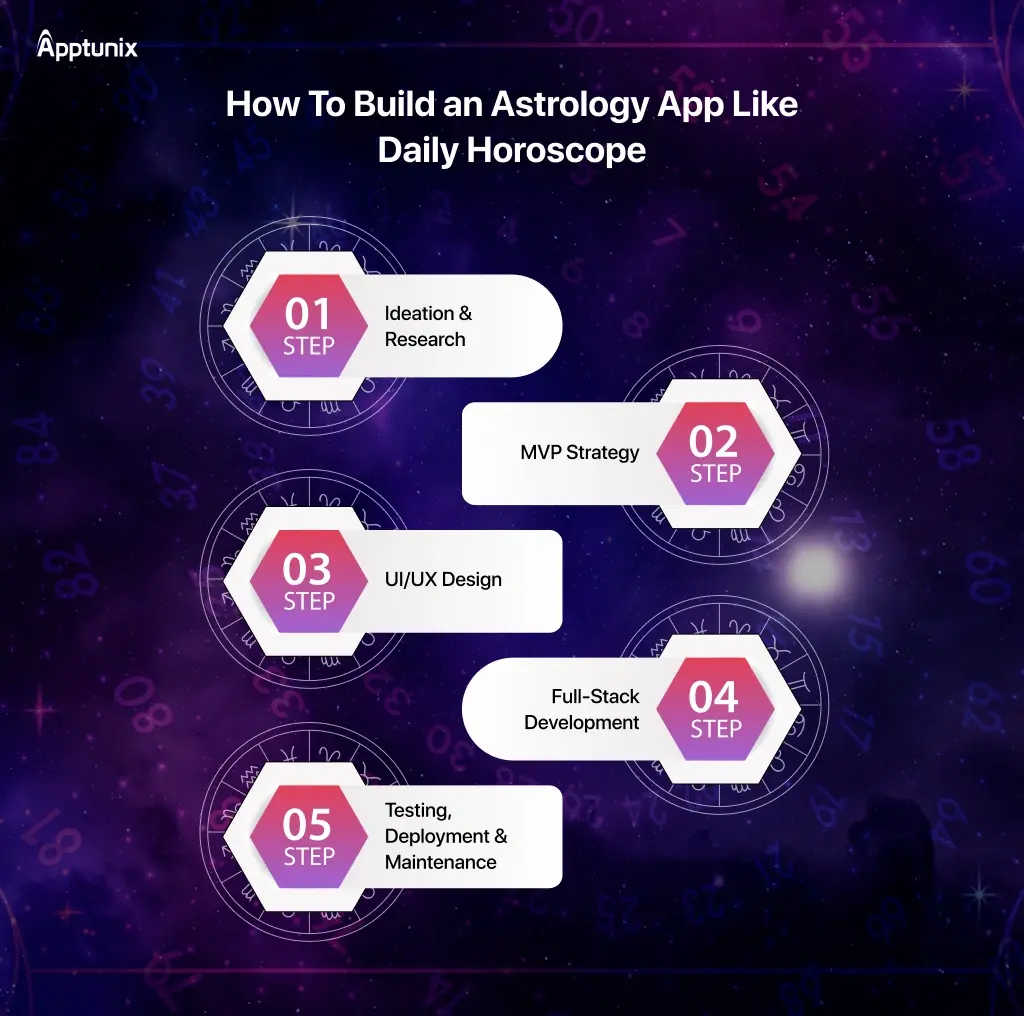
Your concept must be clear before a single line of code is written. Ask:
✔ Who is your audience – daily readers, tarot lovers, or live astrology consultation seekers?
✔ Do you plan a zodiac sign-specific app, a Vedic chart calculator, or an all-in-one mystical experience?
Use this zodiac app development guide as your base to define scope and features. Also, research top astrology apps to identify gaps and innovation zones.
The MVP (Minimum Viable Product) must strike a balance between user delight and development feasibility. It must typically include:
Tip: You can use astrology mobile app builder tools like GoodBarber or Thunkable for rapid MVP prototyping, but for scaling or AI integration, custom development is key.
At this stage, your app takes visual shape. Focus on:
Your design must feel ethereal, yet intuitive.
Our expert developers work across:
Plus, we integrate AI in astrology app development using OpenAI and machine learning models trained on planetary data + user behavior.
Your app is now thoroughly tested across:
Then comes app store deployment, SEO metadata optimization, and real-time monitoring.
Bonus Read: How to Develop an Astrology App Like Co-Star?
When it comes to astrology app development, your budget and timeline largely depend on the complexity of features, platform selection, and AI integration. Whether you are launching a daily horoscope app clone or a full-featured AI-powered zodiac platform, understanding the investment helps you plan better.
The average cost to develop a horoscope app ranges from $15,000 to $100,000+, based on complexity:
| App Type | Estimated Cost (USD) | Description |
|---|---|---|
| Basic Horoscope App | $15,000 – $30,000 | Daily zodiac predictions, simple UI, limited compatibility features |
| Mid-Level Astrology App | $30,000 – $70,000 | Includes birth charts, live chat, compatibility tools, and personalization |
| Advanced AI-Powered App | $70,000 – $100,000+ | AI-generated horoscopes, ML insights, cross-platform, cosmic UI, rich UX |
Note: These estimates vary depending on your region, team model (in-house vs outsourced), and tech stack.
The timeline to develop an astrology app can range from 3 to 12 months, depending on your feature set, integrations, and whether you are using off-the-shelf templates or custom builds.
Here’s a breakdown to guide your project milestones:
| Development Phase | Time Estimate | Cost Estimate (USD) |
|---|---|---|
| Planning & Discovery | 1 – 2 weeks | $2,000 – $5,000 |
| UI/UX Design | 2 – 4 weeks | $3,000 – $7,000 |
| Core Development (Frontend + Backend) | 2 – 4 months | $12,000 – $40,000 |
| AI Integration & Data Training | 1 – 2 months | $10,000 – $30,000 |
| Testing & QA | 2 – 3 weeks | $2,000 – $5,000 |
| Deployment & App Store Approval | 1 – 2 weeks | $1,000 – $3,000 |
| Post-Launch Support (Optional) | Ongoing | Based on SLA |
Pro Tip: Fast-track your launch with an MVP in 10 – 14 weeks, then scale with AI and monetization features.
Creating a stunning astrology app is just half the journey. Turning it into a revenue-generating machine is where the real magic happens. Well, with the global spiritual-tech economy on the rise, your app can earn through multiple monetization streams while keeping users delighted and engaged.
Let’s break down the most effective ways to monetize your astrology app, backed by successful industry examples and proven growth tactics.
Monetizing an astrology app isn’t about aggressive ads or one-off purchases, but about designing value that users are happy to pay for. Here’s what works best:
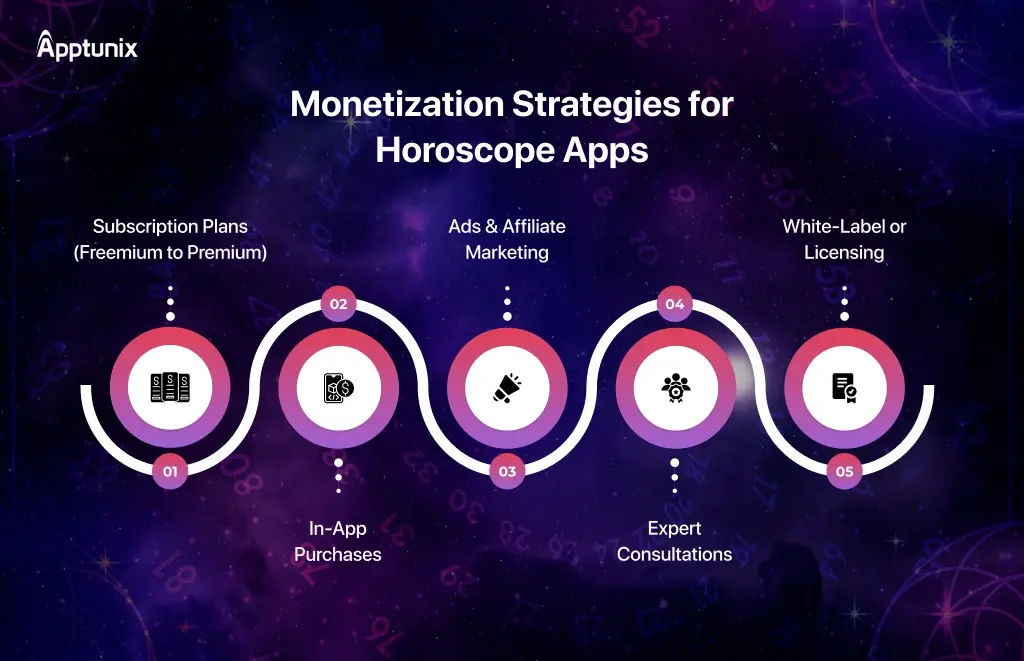
Offer basic horoscopes for free while locking premium features behind a paywall:
Ideal for retaining long-term users and generating steady MRR (Monthly Recurring Revenue)
Sell one-time services or digital products like:
This will benefit you a lot.
Integrate tasteful, non-intrusive ads or recommend relevant spiritual products (e.g., books, crystals, retreats). Use affiliate links to earn passive income.
Charge users for 1:1 astrologer video chats or live Q&A sessions – either per-minute or bundled packages.
Example: Astroyogi & Keen offer expert consultation services starting from $0.99/minute.
If your platform scales, offer white-labeled versions or license your AI prediction engine to other apps, spiritual brands, or wellness influencers.
Also read our eGuide on: App Monetization Strategies: How to Make Money From an App?
When you build an app like The Daily Horoscope, replicating their tech is not enough. You must also model their launch tactics that made them a household name.
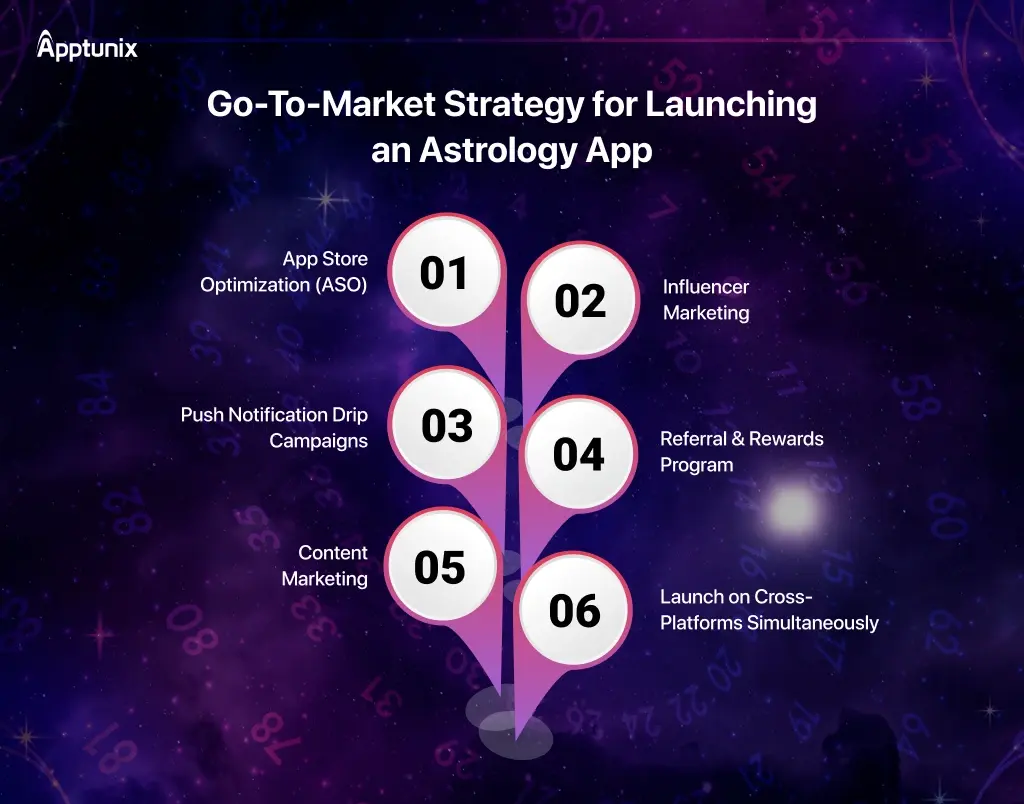
Launch Playbook:
When it comes to App Store Optimization (ASO), use keywords like daily horoscope, zodiac signs, birth chart app, and ensure your icon and screenshots reflect cosmic themes.
Partner with TikTok astrologers, YouTube tarot readers, and Instagram mystics to drive viral installs.
Send curated horoscopes, full moon alerts, or love readings. Timed push notifications increase retention dramatically.
Reward users for inviting friends. It creates exponential organic growth with little spend.
Create a blog optimized for high-intent keywords: best astrology apps, how accurate are horoscopes, zodiac compatibility calculator, in order to drive inbound users searching for answers.
Thanks to cross-platform horoscope app development, you can target the Android and iOS markets together for better early visibility.
You must know that monetization doesn’t start after development – it’s baked into your astrology app development strategy from day one. And the best monetization model? One that feels like value, not a transaction.
Undoubtedly, the digital astrology space is booming, with apps becoming more intelligent, more interactive, and more user-centric every year. As we move into 2025, the competitive bar continues to rise, and to succeed, you must not only match the best but out-evolve them.
Let’s explore the top horoscope apps in 2025, what’s making them successful, and the emerging technology and user experience trends shaping the future of astrology.
Here’s a snapshot of industry-leading astrology apps and the standout features that keep users coming back daily.
| App | Standout Feature |
|---|---|
| AstroSage | Vedic astrology engine + in-app language localization for Indian regional audiences |
| Astrotalk | Real-time astrologer consultations with ratings + wallet integration |
| Sanctuary | AI-powered daily readings + chatbot-style user interface |
| Co-Star | NASA-powered planetary data + edgy, Gen-Z-centric push notifications |
| Chani | Personalized astrology + mindfulness integration for wellness |
| Time Nomad | Advanced charts, transits, and lunar calendars for pro users |
| The Pattern | Deep psychological insights + social astrology features |
AI in Astrology App Development: The Next Leap
As AI matures, its role in astrology app development is becoming more powerful and more expected by users.
Key AI trends shaping 2025 include:
The apps that integrate AI meaningfully, not just for novelty, but for emotional accuracy, are seeing the highest engagement and retention in 2025.
With users switching devices often and expecting unified experiences, cross-platform horoscope app development has moved from optional to industry standard.
Why it matters in 2025:
Flutter and React Native are the frameworks of choice, with added support for web apps and smart TV integrations (hello, zodiac forecasts on your Samsung Smart Hub!).
Last but not least, success in 2025’s astro-tech market will come down to innovation + execution. Learning from the top players is key, but crafting a unique blend of AI, UX, culture, and spiritual value is how you’ll truly stand out.
When you are ready to turn your astrology app idea into a scalable and revenue-generating digital product, you need more than just developers – you need a visionary partner. At Apptunix, we are not only one of the world’s top-rated astrology app development companies, but we are also pioneers in building cosmic-tech experiences that resonate with users worldwide.
Here’s why businesses across the US, Singapore, the UK, India, South Africa, Canada, and beyond trust us to bring their astrology apps to life.
From daily horoscope app clones to complex platforms powered by AI, machine learning, and real-time compatibility algorithms, we have done it all.
Our dedicated team of astrology app developers understands the spiritual, emotional, and technological layers involved in crafting celestial platforms that captivate and convert.
We offer full-cycle development – right from the first ideation sketch to final App Store launch (and beyond). Our comprehensive astrology app development services include:
✔ Zodiac engine & ephemeris API integration
✔ AI-powered horoscope generation & chatbots
✔ Intuitive UI/UX with cosmic visual branding
✔ Cross-platform deployment (iOS, Android, Web)
✔ Admin dashboards & monetization architecture
✔ Post-launch support, analytics, and scale-readiness
Whether you are launching an MVP or a full-fledged astrology ecosystem, our solutions grow with you.
Some of our proudest launches have gone on to reach:
Q 1.What features are essential in an astrology app?
An astrology app must include daily horoscopes, zodiac sign picker, birth chart analysis, compatibility checks, live astrologer chat, push notifications, and AI-driven personalized predictions. A great user experience with an intuitive UI and accurate ephemeris data is also essential.
Q 2.How much does it cost to build an astrology app?
The cost to develop an astrology app typically ranges from $15,000 to $100,000+, depending on features, platforms, and AI integration. MVPs are more affordable, while advanced apps with machine learning and real-time chats cost more.
Q 3.How do I create an app like The Daily Horoscope?
To build an app like The Daily Horoscope, start with market research, design a minimalist UI, develop core features like daily zodiac predictions, integrate an ephemeris API, and launch on iOS/Android. Partnering with some of the top astrology app development companies like Apptunix ensures faster and smarter execution.
Q 4.What tech stack is best for astrology apps?
The best tech stack includes Flutter or React Native for cross-platform UI, Node.js or Python for backend, Firebase or MongoDB for secure databases, and astrology APIs like Swiss Ephemeris. For AI features, use TensorFlow, GPT, or OpenAI integrations.
Q 5.How can I monetize my astrology app?
You can monetize your astrology app using subscriptions, in-app purchases (e.g., tarot spreads), ads, affiliate partnerships, and paid live astrologer consultations. Combining multiple revenue models ensures higher lifetime value and sustainable app growth.
Q 6.What is AI’s role in astrology apps?
AI enhances astrology apps by offering personalized predictions, chatbots, emotion-aware insights, and machine learning-based recommendations. It helps refine accuracy, engage users longer, and automate horoscope generation at scale, thus making the experience feel deeply tailored.
Q 7.Why hire astrology app developers vs freelancers?
Hiring dedicated astrology app developers ensures domain expertise, full-cycle support, better scalability, and reliable post-launch service. Freelancers may lack experience with ephemeris APIs, AI integration, or app store optimization – all vital for success in this niche.
Q 8.Which is the best astrology app development company?
The best astrology app development companies, like Apptunix, specialize in building scalable apps with advanced features such as AI-powered predictions, live astrologer consultations, and multilingual support. Choosing an experienced partner ensures faster time-to-market and long-term success.
Q 9.How long does it take to develop an astrology app?
Astrology app development usually takes 3 – 6 months for a basic MVP and 6 – 12 months for a feature-rich platform with AI integration, live streaming, and secure payment gateways. The exact timeline depends on complexity, design, and third-party API integrations.
Q 10.How do astrology apps generate revenue?
Astrology apps generate revenue through subscription models, personalized horoscope reports, premium features, and in-app ads. Live video consultations and eCommerce integrations for spiritual products also help boost long-term profitability.
Q 11.Can astrology apps support multiple languages and regions?
Yes, modern astrology apps can support multilingual interfaces and region-specific astrology systems (like Vedic, Western, or Chinese). This helps attract a global audience and makes the app more inclusive for diverse users.
Q 12.What compliance and security measures are needed for astrology apps?
Astrology apps must follow GDPR, CCPA, and local data protection laws to ensure user privacy. Implementing secure logins, encrypted chats, and safe payment gateways is essential to building user trust and meeting global compliance standards.
Get the weekly updates on the newest brand stories, business models and technology right in your inbox.
Book your free consultation with us.
Book your free consultation with us.





